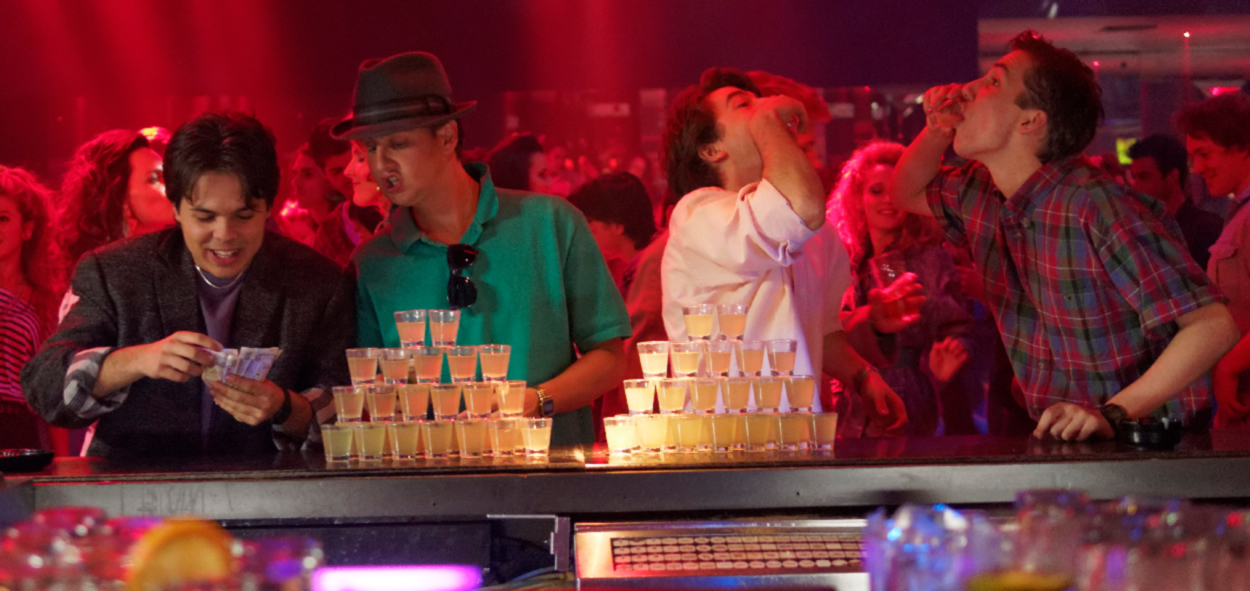There’s more than a little bit of inspiration drawn from Québécois director-writer Ricardo Trogi’s life in his latest, 1987. Screened as part of the Canadian cut at Possible Worlds, he himself estimates that “about 75% [of the film is] straight autobiography.” Unfortunately, Trogi is unable to transform this nostalgic material into a compelling coming-of-age story. The authenticity would certainly be welcome in 1987, but it seems to falter when pressed to reach beyond ’80s anthems and cringe-worthy haircuts. 1987 lacks the ironic distance or self-awareness to have us along for the ride in laughing at the antics of its misguided protagonist.
Presumably, the film picks up where Trogi’s previous feature 1981 left off. 1 Seventeen-year-old Ricardo Trogi (Jean-Carl Boucher, who reprises his role from 1981) attempts to navigate the pitfalls of encroaching adulthood as his high school graduation signals the need for a direction in life. His mother Claudette (Sandrine Bisson) and father Benito (Claudio Colangelo) push for Ricardo to get a job, while Ricardo’s own concerns couldn’t be more unalike: losing his virginity, acquiring a sweet ride, successfully sneaking into bars with his friends. Frustrated with his options, he opts for a more dishonest but lucrative tactic in stealing car radios.
Trogi is treading familiar territory, and there’s a certain saving grace in the enduring appeal of ‘teen’ films – broad as that category may be. Nevertheless, the film is notably absent of depth or a sense of consequence. There is a stipulation of character transformation in coming-of-age stories – it’s implicit in the very label of the genre it entails, but isn’t evident in 1987. Ricardo is caught partaking in criminal activities, but the repercussions are barely skimmed over: he gets released, and comes home to his parents who seem less livid than exhausted. There is no resulting action that pressures our protagonist to change, to test his own limits. Trogi almost entirely maintains the narrative’s status quo, even under the circumstances in which his protagonist is meant to be confronted by the true meaning of his shift from teenage dope to wanna-be Mafioso. Instead, he decides to chase after his ex-girlfriend Marie-Josée (Éléonore Lamothe). In light of the film’s absent third act, the rest of the film’s structure is rendered moot. In essence, the plot wanders as aimlessly as its protagonist: no urgency, no direction, nothing of significance.
The irreverence of the film isn’t necessarily an issue: teenager-dom remains steadfastly a time of self-absorption, and of high stakes amounting to only as much as making it past the bouncer into a bar. Yet in framing the film the way Trogi does – retrospectively, through the reminiscent narration of an older and wiser Ricardo – there is an expectation of an ironic distance and of self-awareness through age that lends itself to telling this kind of flippant coming-of-age story. Largely, that self-awareness goes missing when the structure fails to establish and explore the effects of its characters. Regrettably, this lends the film a somewhat indulgent air, especially in light of 1987’s quasi-sequel status. It feels as if Trogi is giving us an offhand, meandering account of his teenage years, rather than a polished work that takes inspiration from it. Resultantly, the film doesn’t keep up with the likes of similar films – George Lucas’ American Graffiti (1973) being but one that unearths meaning from its characters set adrift by graduation and imminent adulthood. Noteworthy, too, is the fact that Lucas’ film was loosely autobiographical.
These criticisms are not to say that the film doesn’t achieve moments of amusement. There are clever little additions that clarify Ricardo’s simplistic outlook – in particular, the titles that come up on screen over a freeze-frame to denote the characters’ assets in very cursory terms: “Trogi: 17. Job: Mafioso. Style: Borrowed. Assets: A Lada and more to come.” The intermittent scenes in which Ricardo converses with the Premier of Québéc and his advisors achieve a similar effect –these are mental conversations within Ricardo’s head which translate his concerns and desires in an amusing, surreal way.
However, even these comedic moments don’t alleviate the undercurrent of sexism that rears its head from time to time. One of Ricardo’s friends and a frustrated virgin, Dallaire (Pier-Luc Funk), denounces girls as, “Sluts, every last one of them” at the news that his best friend has been cheated on, while taking a swig of wine. Ricardo fails to react to his friend’s remark. Additionally, it’s baffling to note that both Ricardo’s mother is barely fleshed out beyond her obsession with dieting, nor Marie the girlfriend beyond her teary indecision as to whether they should have sex finally – the latter a constant source of frustration to Ricardo – until she cheats on him. Ultimately, it’s an undercurrent that can’t quite be forgiven or explained away by teenage boy antics.
There is an ambivalence towards the lives of Ricardo and the others that 1987 makes a purposeless recount of a teenage summer at best.
Around the Staff:
| Conor Bateman |

